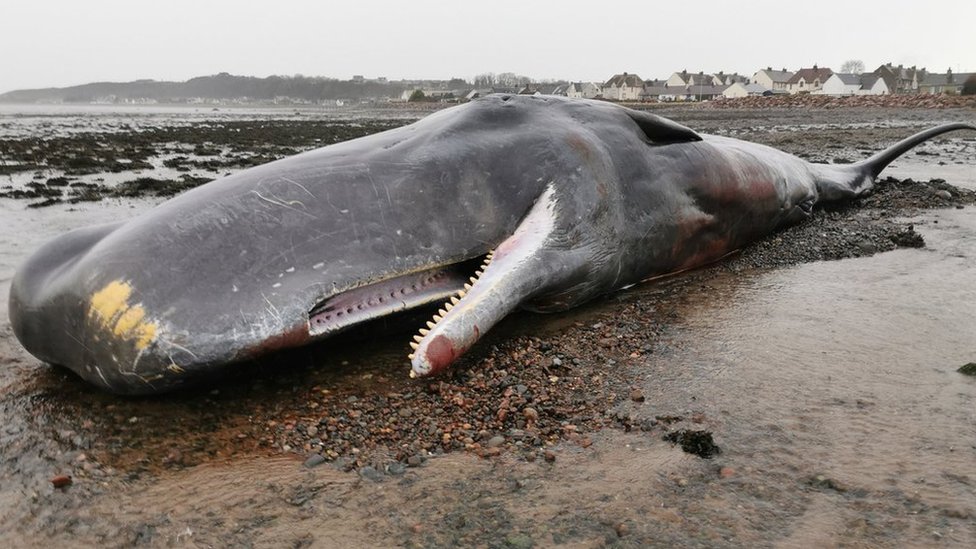

They also reacted when the researchers played this sequence to them. In certain situations, the birds combine two different calls to warn each other when a predator approaches. But in 2016, Japanese researchers published a study in Nature Communications on the vocalizations of great tits. For a long time, scientists were convinced that animal communication lacked any sentence structure.
#Sperm whale how to#
The second condition is grammar: rules for how to build sentences. That means that certain vocalizations have a fixed meaning that does not change.” Siberian jays, a type of bird, for example, are known to have a vocabulary of about 25 calls, some of which have a fixed meaning. This isn’t simply about the barking of dogs: several conditions have to be met. Brensing is convinced that the utterances of many animals can certainly be called language. “I rather think that we haven’t looked closely enough yet,” counters Karsten Brensing, a German marine biologist who has written multiple books on animal communication. “Animals do not possess a language in the true sense of the word,” Lorenz wrote. Animals communicate, but they do not speak, said Austrian biologist Konrad Lorenz, one of the pioneers of the science of animal behavior, who wrote about his own communications with animals in his 1949 book King Solomon’s Ring. For many, language is one of the last bastions of human exclusivity. For a deeper analysis, the algorithms needed more context and more data-millions of whale codas.īut do animals have language at all? The question has been controversial among scientists for a long time. But this was no more than a proof of concept. “They seemed to be working very well, at least with some relatively simple tasks,” he says. Bronstein applied some machine-learning algorithms to the data. Fortunately, Gruber knew a biologist named Shane Gero who had been recording a lot of sperm whale codas in the waters around the Caribbean island of Dominica since 2005. Bronstein was convinced that the codas, as the brief sperm whale utterances are called, have a structure that lends them to this kind of analysis. At a dinner party, they presented the idea to Bronstein, who was following recent advancements in natural language processing (NLP), a branch of AI that deals with the automated analysis of written and spoken speech-so far, just human language. I never thought he was going to take me seriously.”īut the fellowship was an opportunity to take far-out ideas seriously. “I said, ‘Maybe we should do a project where we are translating the whale sounds into something that we as humans can understand,’” Goldwasser recounts. That’s how sperm whales talk to each other, Gruber told her.
#Sperm whale series#
Goldwasser, who had just been named the new director of the Simons Institute for the Theory of Computing at the University of California, Berkeley, had heard a series of clicking sounds that reminded her of the noise a faulty electronic circuit makes-or of Morse code. It started in 2017 when an international group of scientists spent a year together at Harvard University in Cambridge, Massachusetts, at the Radcliffe Fellowship, a program that promises “an opportunity to step away from usual routines.” One day, Shafi Goldwasser, a computer scientist and cryptography expert also from Israel, came by the office of David Gruber, a marine biologist at City University of New York. If Project CETI (for Cetacean Translation Initiative) succeeds, it would be the first time that we actually understand what animals are chatting about-and maybe we could even have a conversation with them. But his skills as an expert in machine learning could be key to an ambitious endeavor that officially started in March 2020: an interdisciplinary group of scientists wants to use artificial intelligence (AI) to decode the language of these marine mammals. The Israeli computer scientist, teaching at Imperial College London, England, might not seem the ideal candidate for a project involving the communication of sperm whales. I have never seen a whale in my life,” says Michael Bronstein. Listen now, download, or subscribe to “Hakai Magazine Audio Edition” through your favorite podcast app. This article is also available in audio format.
#Sperm whale download#
Stream or download audio For this article Octo| 2,400 words, about 12 minutes Share this article Photo by Amanda Cotton/Project CETI Are We on the Verge of Chatting with Whales? An ambitious project is attempting to interpret sperm whale clicks with artificial intelligence, then talk back to them. Researchers are hoping to decipher the communications of sperm whales.


 0 kommentar(er)
0 kommentar(er)
